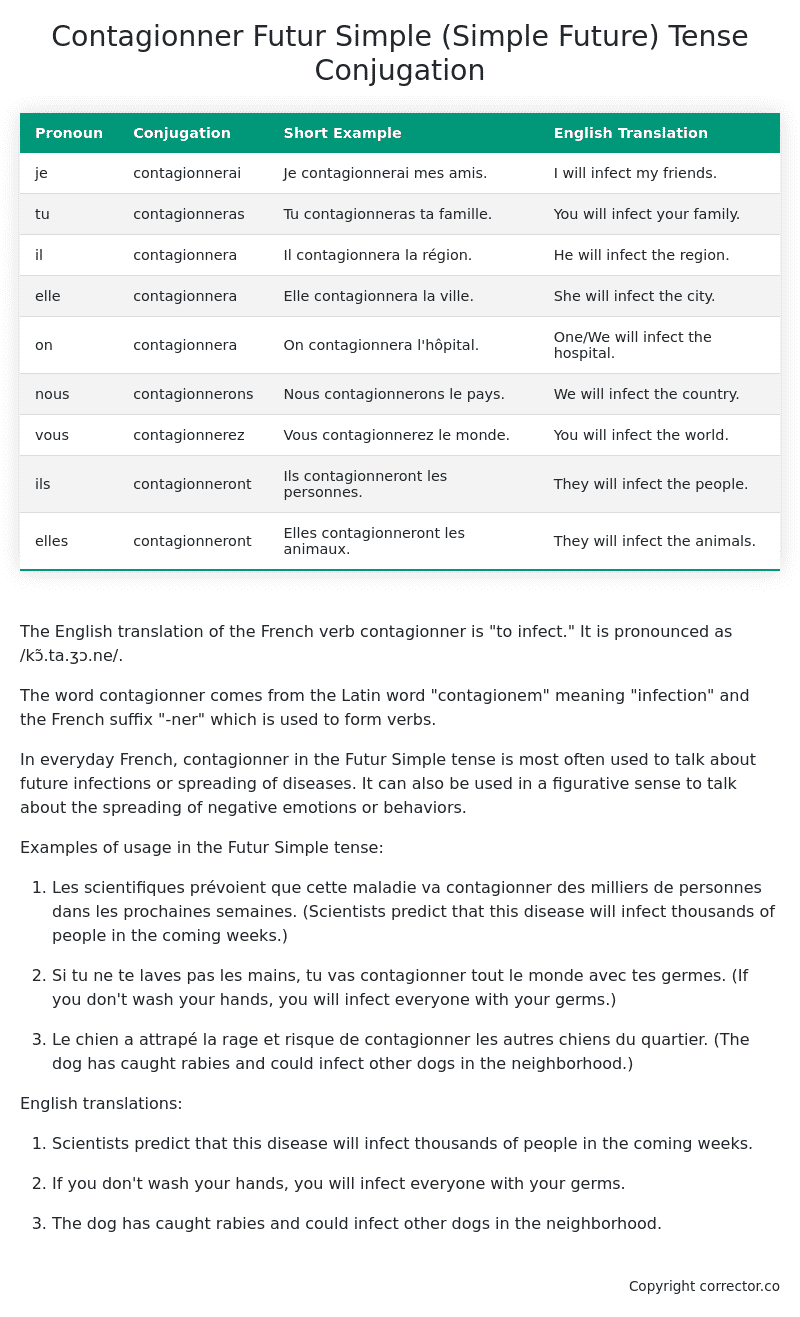Futur Simple (Simple Future) Tense Conjugation of the French Verb contagionner
Introduction to the verb contagionner
The English translation of the French verb contagionner is “to infect.” It is pronounced as /kɔ̃.ta.ʒɔ.ne/.
The word contagionner comes from the Latin word “contagionem” meaning “infection” and the French suffix “-ner” which is used to form verbs.
In everyday French, contagionner in the Futur Simple tense is most often used to talk about future infections or spreading of diseases. It can also be used in a figurative sense to talk about the spreading of negative emotions or behaviors.
Examples of usage in the Futur Simple tense:
-
Les scientifiques prévoient que cette maladie va contagionner des milliers de personnes dans les prochaines semaines. (Scientists predict that this disease will infect thousands of people in the coming weeks.)
-
Si tu ne te laves pas les mains, tu vas contagionner tout le monde avec tes germes. (If you don’t wash your hands, you will infect everyone with your germs.)
-
Le chien a attrapé la rage et risque de contagionner les autres chiens du quartier. (The dog has caught rabies and could infect other dogs in the neighborhood.)
English translations:
-
Scientists predict that this disease will infect thousands of people in the coming weeks.
-
If you don’t wash your hands, you will infect everyone with your germs.
-
The dog has caught rabies and could infect other dogs in the neighborhood.
Table of the Futur Simple (Simple Future) Tense Conjugation of contagionner
| Pronoun | Conjugation | Short Example | English Translation |
|---|---|---|---|
| je | contagionnerai | Je contagionnerai mes amis. | I will infect my friends. |
| tu | contagionneras | Tu contagionneras ta famille. | You will infect your family. |
| il | contagionnera | Il contagionnera la région. | He will infect the region. |
| elle | contagionnera | Elle contagionnera la ville. | She will infect the city. |
| on | contagionnera | On contagionnera l’hôpital. | One/We will infect the hospital. |
| nous | contagionnerons | Nous contagionnerons le pays. | We will infect the country. |
| vous | contagionnerez | Vous contagionnerez le monde. | You will infect the world. |
| ils | contagionneront | Ils contagionneront les personnes. | They will infect the people. |
| elles | contagionneront | Elles contagionneront les animaux. | They will infect the animals. |
Other Conjugations for Contagionner.
Le Present (Present Tense) Conjugation of the French Verb contagionner
Imparfait (Imperfect) Tense Conjugation of the French Verb contagionner
Passé Simple (Simple Past) Tense Conjugation of the French Verb contagionner
Passé Composé (Present Perfect) Tense Conjugation of the French Verb contagionner
Futur Simple (Simple Future) Tense Conjugation of the French Verb contagionner (this article)
Futur Proche (Near Future) Tense Conjugation of the French Verb contagionner
Plus-que-parfait (Pluperfect) Tense Conjugation of the French Verb contagionner
Passé Antérieur (Past Anterior) Tense Conjugation of the French Verb contagionner
Futur Antérieur (Future Anterior) Tense Conjugation of the French Verb contagionner
Subjonctif Présent (Subjunctive Present) Tense Conjugation of the French Verb contagionner
Subjonctif Passé (Subjunctive Past) Tense Conjugation of the French Verb contagionner
Subjonctif Imparfait (Subjunctive Imperfect) Tense Conjugation of the French Verb contagionner
Conditionnel Présent (Conditional Present) Tense Conjugation of the French Verb contagionner
Conditionnel Passé (Conditional Past) Tense Conjugation of the French Verb contagionner
L’impératif Présent (Imperative Present) Tense Conjugation of the French Verb contagionner
L’infinitif Présent (Infinitive Present) Tense Conjugation of the French Verb contagionner
Struggling with French verbs or the language in general? Why not use our free French Grammar Checker – no registration required!
Get a FREE Download Study Sheet of this Conjugation 🔥
Simply right click the image below, click “save image” and get your free reference for the contagionner Futur Simple tense conjugation!

Contagionner – About the French Futur Simple (Simple Future) Tense
Formation of Futur Simple
For regular -er verbs (e.g., parler – to speak)
For regular -ir verbs (e.g., finir – to finish)
For regular -re verbs (e.g., vendre – to sell)
Common Everyday Usage Patterns
Conditional Statements
Interactions with Other Tenses
Futur Antérieur
Conditional
Present
Summary
I hope you enjoyed this article on the verb contagionner. Still in a learning mood? Check out another TOTALLY random French verb conjugation!


